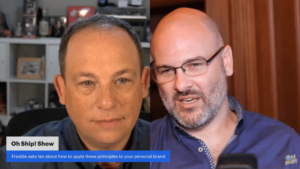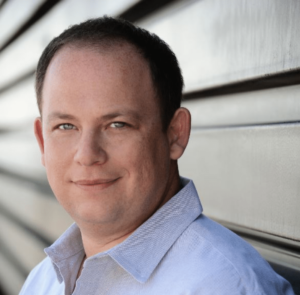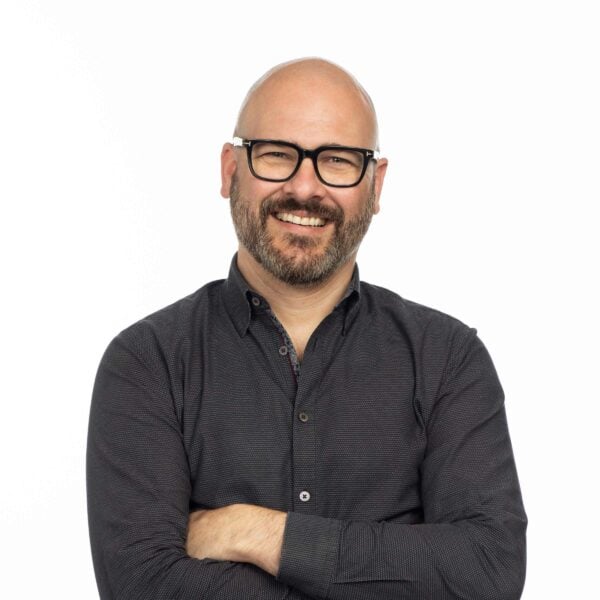In a recent episode, host Freddie Laker speaks with Schafer about finding a business balance between personal motivation and profitability.

There’s nothing wrong with going into business seeing dollar signs and infinite potential. A successful business should afford you a lifestyle you enjoy. But there’s also something to be said about creating a purpose-driven business, one that is fulfilling and feels less like work and more like a passion. How can you align purpose and profit to build a business that serves you just as much as you serve it?
In a recent episode of the Oh Ship! Show, host Freddie Laker chats with long-time friend and former colleague Ian Schafer to discover his secrets on leadership development and creating a business without compromise.
About Ian Schafer

Kindred and Deep Focus Founder and CEO Ian Schafer formerly served as the Chief Experience Officer of Engine Group before creating his own company. Kindred is a platform focused on ESG leadership development, a priority that’s becoming increasingly important for businesses in the modern world. Schafer has been called a “media maven” by Advertising Age and has received numerous accolades from AdWeek, Campaign Magazine, Business Insider, and other outlets.
It’s clear that Schafer has amassed quite a bit of fame through his career—and plenty of profit to go with it. But he doesn’t allow fame or money to overshadow his purpose, which is why he’s a reliable authority to speak on how to align purpose with profit. Here’s what he had to say:
Laker: Where did your quest start in aligning purpose with profit?
Embarking on a quest for success—whether in business or in general—rarely looks the way we envision. Schafer discovered this to be true, which got him thinking about what it really means to be successful and how he wanted success to look for him.
“I’ve worked for a lot of companies, and they’ve all taught me a little something. At one major film company I worked for, I ended up leaving because of how employees were treated and the general lack of respect given to other people’s opinions. It wasn’t something I could bear to witness day in and day out. It was at that point I decided that I couldn’t work for another company because I couldn’t risk having that kind of negativity flying around me. So I decided to build my own, and that was the start of Deep Focus.”
Laker: How do profits follow purpose and vice versa?
Schafer created his agency as a way to transform other businesses and discovered that true transformation was only possible when it involved the entire company.
“Social media and the shift in how we consume content have presented so many opportunities for change. In the early days of Deep Focus, I found that companies didn’t need a Chief Digital Officer in order to make a successful transition to digital. What they needed was a CEO that takes digital transformation so seriously that it becomes a mandate throughout the enterprise. It’s not about one agent of change but rather embedding change fundamentally in the culture and DNA of the business.” That’s the foundation of purpose—making it an ingrained part of how the business operates.
Schafer says the same holds true for companies that use their values as a speakerbox to connect with their audiences—it only works if those values are truly felt, upheld, and demonstrated by the company. For example, it’s become somewhat trendy for brands to talk about environmental issues and social justice and use these in their marketing. Schafer notes that 68% of people trust businesses and business leaders to step in and take action on things that governments won’t. “People are changing their buying decisions based on shared values. But while a lot of brands have something to say on social issues or sustainability or other hot button topics, a lot of times, their words are way ahead of their actions. I compare it to the old way of caring: writing a check. It doesn’t help the situation.”
Schafer noticed an uptick in calls from brands and companies that were increasingly interested in steering their marketing toward social issues, but he says they failed every test when it came to how the company behaved compared to their words.
“Companies don’t make decisions; people do. What needs to happen for people to make better decisions about how they behave?” This is a prime example of why purpose and profit need to be in alignment—because the combination of the two is often greater than the sum of its parts.
Laker: What does the pivot to aligning purpose with profit look like?
Schafer believes that it’s not the strongest businesses that survive but rather the ones that are the best at adapting and remaining flexible.
Schafer believes that many companies simply don’t realize the increasingly important role they play in society, but knowing the weight of their role can help them to remain more flexible and able to adapt. “During the transparency and purpose narratives a few years ago, we emerged from the era where companies could hide on Wall Street or in their stock prices where they could claim that profits were their purpose. Because how else could for-profit companies write checks to non-profit organizations? But we’ve moved on from that mentality. Now, purpose is a matter of intention and recognizing the ripple effects from those intentions.”
Schafer refers to the critical role companies play in communities, citing that a person’s healthcare is tied to the workplace as an example. “The role that business plays in society has become increasingly more important. People’s voices who are affected by a company’s decisions have gotten louder… If you can pivot to bottling hand sanitizer during the pandemic, surely you can pivot to change the constitution of your board.”
Hear the entire Oh Ship! Show episode on how to align purpose and profit with Freddie Laker and Ian Schafer on Chameleon Collective’s YouTube channel.




